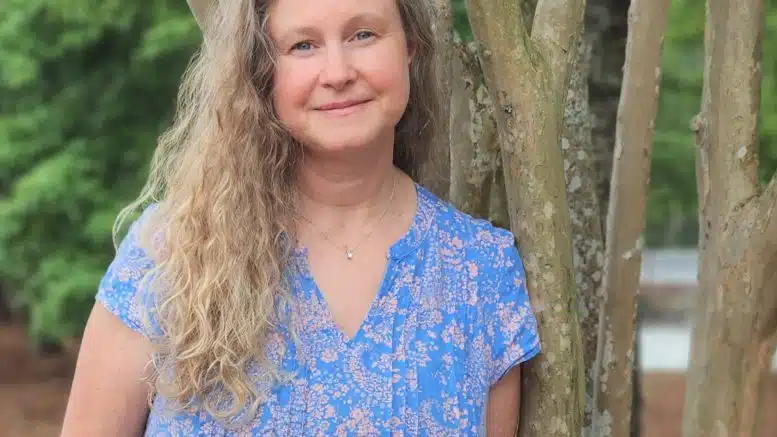By Lucas Thomae
While a pre-med student at UNC Chapel Hill, Amy Hawkins had always thought she would continue her education at a traditional medical school. She questioned that path after seeing a loved one struggle to stay healthy despite consistent medical care.
As her ailing grandmother suffered from chronic obstructive pulmonary disease, Hawkins said that she saw a medical system that was more concerned with treatment of symptoms than prevention of disease.
“She was just continually given more and more and more steroids and became less and less healthy,” Hawkins said.
After graduating from UNC in 1995 with a degree in biology, Hawkins took a different path than what she’d initially planned, instead pursuing her interest in herbal medicine. In 2007, she earned a doctorate in naturopathic medicine from Bastyr University in Washington and started her own practice in Seattle soon after.
Naturopathic doctors look to identify and stop the underlying causes of disease rather than treating symptoms. They avoid prescription drugs when possible, and their treatment methods may include providing diet plans or herbal medicines and supplements.
Naturopathic doctors are trained as primary health care providers and attend four-year naturopathic medical schools. (There are five accredited institutions in the U.S. and two in Canada.) Graduates from these schools then have to sit for the Naturopathic Physicians Licensing Examinations to become licensed.
These doctors are licensed health care providers in the state of Washington, where Hawkins worked for five years. They are recognized as primary care physicians and have the authority to prescribe medications and work in hospitals. The same is true for naturopathic doctors in Oregon, Arizona and nearly a dozen other states.
That is not the case in North Carolina, although naturopathic doctors here have advocated for licensure for years. They argue that licensure would increase patients’ access to a more affordable form of health care while simultaneously protecting North Carolinians from unqualified medical providers. A new bill making its way through the General Assembly this session would establish such a licensing board.
Hawkins returned to North Carolina, her home state, in 2012 to be closer to family. She said the move “was not the best decision for [her] career,” since she lost the primary care and prescribing privileges afforded to her by licensure in Washington. Hawkins set up a new practice in Wilmington where she specializes in women’s health, but the scope of her practice is severely limited compared with what she used to be able to do in Washington.
Now, as president of the North Carolina Association of Naturopathic Physicians, Hawkins hopes that will soon change.
Healing Arts Commission
There have been several attempts to license naturopathic doctors over the years, but an unwillingness from state lawmakers to create new licensing boards has prevented much movement. The latest strategy from the sponsors of House Bill 557 — and its companion, Senate Bill 513 — is to group several kinds of alternative health care providers into one licensing board.
Dubbed the “North Carolina Healing Arts Commission,” this board would license and regulate naturopathic doctors, music therapists and reflexologists. Each group has separately advocated for licensure in past legislative sessions.
The American Music Therapy Association defines music therapy as “clinical and evidence-based use of music interventions to accomplish individualized goals within a therapeutic relationship.”
Reflexology is an alternative medical practice which involves the application of pressure to the feet, hands and ears. The Reflexology Association of America claims that these techniques “stimulate the complex neural pathways linking body systems, supporting the body’s efforts to function optimally.” There are 15 certified members of the North Carolina Reflexology Association.
There are 14 members of the Music Therapy Association of North Carolina, according to its website. Appalachian State University has a degree-granting program in music therapy.
Naturopathic doctors are the biggest group, with the state association estimating that there are about 40 licensable doctors in the state.
While the current number of licensable naturopathic doctors in North Carolina is small, Hawkins believes that setting up licensure would attract more practitioners to the state. She says that naturopathic doctors in North Carolina have been steadily leaving to practice in states where they can be fully licensed, like Washington, Oregon and Arizona.
Whether licensure will happen this year depends upon North Carolina lawmakers, who over the past decade have frowned upon creating boards and commissions. In 2012, the legislature contemplated eliminating more than 50 state boards and commissions and downsizing 40 more. Eventually that effort ran out of steam. Nonetheless, the General Assembly has been reluctant to add any regulatory bodies.
The companion bills introduced this year in the state House and Senate that would do that seemed to be on track in April and May. But the proposed legislation has been at a standstill in committees since then.
Naturopathic medicine is nothing new
Naturopathic doctors have been licensed in Washington and Connecticut for more than a century, and in just the past decade seven other U.S. states have passed legislation to set up licensure for these doctors. Supporters of a similar bill in Wisconsin, the most recent state to create a licensing board, cited the need for regulation as the driving factor for their 2022 law.
Pushes for licensure also are gaining traction in response to an increased demand for alternative medical services and products. There has been a growing acceptance of the practices among the public and scientific communities. The National Center for Complementary and Integrative Health, one of the 27 centers and institutes making up the National Institutes of Health, has a mission statement to “define, through rigorous scientific investigation, the usefulness and safety of complementary and alternative medicine interventions and their roles in improving health and health care.”
Susan DeLaney, a 1975 graduate of UNC Chapel Hill’s nursing school and a practicing naturopathic doctor in Carrboro, said that public perception of alternative medicine has grown dramatically more positive in recent years.
DeLaney attended the Natural University of Natural Medicine in Portland after graduating from UNC, then she spent some time in India to continue her studies. She returned to North Carolina in 1987 to practice naturopathic medicine.
“When I first came [to North Carolina], I was considered a quack,” DeLaney said. “But I must say that things have really changed in the past 36 years.”
DeLaney pointed toward acupuncture as an example of an alternative medicine practice which grew in popularity and was regulated to great success.
Acupuncture, a pain management practice derived from Chinese medicine that involves inserting small needles into the skin, first appeared in the U.S. in the early 1970s and since has become largely accepted by the public. Acupuncturists work in hospitals around the country and have become increasingly integrated into cancer care. North Carolina began regulating acupuncturists in 1993, and as of March 2022 there are 677 licensed acupuncturists in the state.
Herbal supplements, a common component of naturopathic medicine, have also exploded in popularity over the past few decades. According to a report from the Nutrition Business Journal, the herbal supplements industry has grown from $4.2 billion in sales in 2000 to $11.3 billion in 2020. The biggest annual change in that growth came during the COVID-19 pandemic, when the industry grew 17.3 percent in 2020 alone.
Still, naturopathic medicine has its fair share of detractors.
The American Academy of Family Physicans’ website states that it opposes licensure of naturopathic doctors. The statement, last updated in September 2022, claims that “naturopathic theory and practice are not based upon the body of basic knowledge related to health, disease, and health care that has been accepted widely by the scientific community.”
The AAFP did not respond to an email asking whether this was still their position.
Britt Marie Hermes, a former licensed naturopathic doctor, is one of the most outspoken critics of the practice. In an April 2020 article published in the Skeptical Inquirer, Hermes said she left the profession after discovering her boss had been attempting to treat cancer patients with a non-FDA approved drug.
“I concluded that naturopathic medicine is a scam,” Hermes wrote. “I was a fake doctor.”
DeLaney said that dangerous incidents like the one Hermes described are why regulation is needed. Rather than disavowing naturopathic medicine as a whole, she argues that practitioners who engage in unsafe or misleading practices should be held under stricter scrutiny by law.
“This is an issue of public safety,” DeLaney said.
A solution to healthcare shortages?
Supporters of licensure say that it not only will protect North Carolinians, but also make primary health care services more readily available to them.
As the licensure bill is written, practitioners would be allowed to use their primary care training and provide basic services like ordering laboratory tests and diagnostic imaging. They would not be allowed to prescribe drugs, perform surgical procedures or diagnose and treat cancer.
Data from the North Carolina Department of Health and Human Services shows that 92 of the state’s 100 counties have some level of shortages of primary medical care providers. The areas with the greatest need are in the eastern part of the state.
“I believe [licensing naturopathic doctors] will add providers in those rural areas where they’re really needed,” Senate Bill 513 sponsor Joyce Krawiec (R-Kernersville) told NC Health News.
However, most members of the North Carolina Association of Naturopathic Physicians are near the state’s urban centers. Hawkins, the president of the association, who is based in Wilmington, is one of the few naturopathic doctors serving the eastern part of the state. She said licensure will make the profession more attractive and draw practitioners to where they are needed most.
The bill doesn’t mention insurance, but Hawkins said licensure could pave the way for insurance companies to start covering naturopathic medicine in the state. That would remove another financial barrier to receiving care.
Naturopathic medicine might also be a more acceptable solution to people who distrust conventional medicine. Hawkins said many of her patients don’t feel comfortable with traditional providers. It was something she noticed when she first began practicing in eastern North Carolina, and it’s a trend that she says was exacerbated by the pandemic.
“There’s a growing distrust of the standard medical system, and unfortunately the outcome of that is that people don’t seek medical care when they need it,” Hawkins said.
By accepting naturopathic doctors into the medical “safety net” of the state, Hawkins hopes that the medical community can begin to build trust with naturopaths and patients.
“If we’re licensed, then we’re part of the system,” Hawkins said. “The MDs and the DOs and the nurse practitioners and the PAs are more comfortable with those referrals. They know us, they trust us, they know we’re licensed — and they know it’s a safe place to send their patients.”









